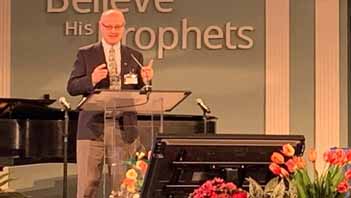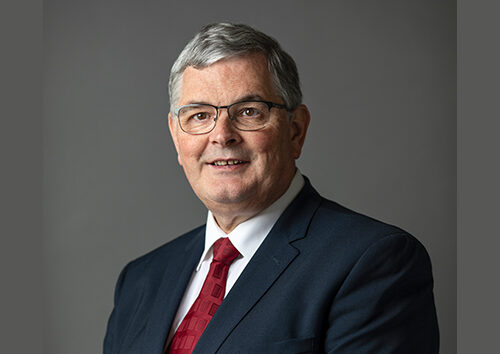15 April 2019 | Washington DC [Marcos Paseggi, Adventist Review / tedNEWS]
TED Leaders participate and share ideas on what is working to keep members in church and engaged.
![Paul Tompkins, Scottish Mission President, shares his practical research on youth retention. [All photos: Audrey Andersson] NR summit tompkins](https://ted.adventist.org/sitenews/wp-content/uploads/2019/04/images_news-2019_NR-summit-tompkins.jpg) “Do you think you’ll still be an Adventist by age 40?” asked Scottish Mission president Paul Tompkins to an 18-year-old a few years ago. “I hope I’ll still be an Adventist by age 40,” she answered, “but I’m not so sure about next year.”
“Do you think you’ll still be an Adventist by age 40?” asked Scottish Mission president Paul Tompkins to an 18-year-old a few years ago. “I hope I’ll still be an Adventist by age 40,” she answered, “but I’m not so sure about next year.”
Tompkins, a presenter at the 2019 Nurture and Retention Summit at the Adventist Church headquarters on April 7, 2019, used this exchange to illustrate how young people often relate to time. “Turning 40 seems far off,” he said. “They are more worried about the here and now.”
Tompkins said that an evaluation of risks in the region he serves has identified their number-one risk: Children and young adults not buying into Adventism.
“Why are they leaving?” Tompkins asked. Answering his own question, he said that even though some reasons are difficult to articulate, there are some things any church and church region can do to slow down and even prevent this disengagement process. He was among scores of other church leaders from around the world, who met in Silver Spring, Maryland, United States, for the three-day event, and also shared what they are doing to reverse the trend.
Tompkins contribution to the event followed 15 years of youth leadership across the Trans-European division during which time he completed a doctorate in nurture and retention, as well as working closely with his counterparts in the Inter-European Division in the development of the intergenerational Churches of Refugee concept [iCOR]
The key idea is that the church should be “a safe haven that provides protection, mediation, justice, and long-term nurturing care.” At the same time, the initiative seeks to include “all generations, all cultures, and all social classes.”
Meaningful Relationships and Discipleship
Several presenters emphasized that staying in church often has more to do with the positive experiences in the local church than with specific church doctrines. “When it comes to remaining an Adventist, the experience in the local church is much more significant,” Tompkins said. “They need a spiritual home to which they feel they belong.” The question, then, is, ‘How can we help our church become a spiritual home for young people?’
Tompkins and others believe an intentional discipleship programme can help. “Every person should have an age-specific Bible study by age 14,” he said. “We also need key programmes targeting 14-17 year-olds, and discipleship groups for 18-25’s.”
 The Trans-European Division, a church region that encompasses 22 European countries, is working to create safe spaces where children and youth can interact with leaders, according to its executive secretary, Audrey Andersson. “And we are creating resources for discipleship, mentoring, and conflict resolution,” she said.
The Trans-European Division, a church region that encompasses 22 European countries, is working to create safe spaces where children and youth can interact with leaders, according to its executive secretary, Audrey Andersson. “And we are creating resources for discipleship, mentoring, and conflict resolution,” she said.
However, it is more than a youth and children problem. With migration from those post-communist countries that now have the freedom to ‘live the dream’, to the challenges of living in sophisticated secularised societies where people may have spiritual needs but don’t see the answer in formal religion, Andersson, recognised that much of the answer lies around areas of belonging and seeking fulfilment in the mission of the church.
Adventist Church associate youth director Pako Mokgwane presented on the importance of iCOR for young member retention. “In most local churches, participation is skewed towards adults, but the participation of young people in decision-making processes, in leadership, mission and worship heightens the feeling of belonging,” he said. “ICOR offers ten values that foster healthy relationships, and healthy relationships beget healthy churches that keep members and attract more people.”
 Other TED participants included British Union Conference Nurture and Retention expert, Dr Kirk Thomas, who has provided an open platform within his territory to discuss such important issues. He also published a paper on the subject in the April 2019 issue of Ministry Magazine. Paul Lockham, former BUC Executive Secretary, was also present as a member of the 2013 committee.
Other TED participants included British Union Conference Nurture and Retention expert, Dr Kirk Thomas, who has provided an open platform within his territory to discuss such important issues. He also published a paper on the subject in the April 2019 issue of Ministry Magazine. Paul Lockham, former BUC Executive Secretary, was also present as a member of the 2013 committee.
Pooling Resources
Church leaders reported that they are pooling resources from various church ministries to support efforts to keep members — especially young people — engaged and involved in church life.
“Several church departments — Sabbath School and Personal Ministries, Ministerial, Women Ministries — are working together with a discipleship emphasis,” said Inter-American Division (IAD) executive secretary Leonard Johnson. Northern Asia-Pacific Division (NSD) Personal Ministries and Sabbath School director Richard Sabuin had a similar comment. “We are combining the assistance of the Children, Family, and Education departments,” he said of the church union region based in Korea. “In that way we cover all areas — school, home, and church,” he emphasized.
For Adventist Church education director, Lisa Beardsley-Hardy, it makes sense to call on education, since Christian education has shown itself to be a strong predictor of young people staying in church beyond their teenage years. In a joint presentation with education associate director, John Wesley Taylor V, Beardsley-Hardy explained that research demonstrates that students who attend an Adventist school are much more likely to be baptized and to remain Seventh-day Adventist.
“They are also more likely to marry a Seventh-day Adventist and to financially support the church through tithes,” she said. “Primary education has the greatest positive impact, followed by secondary and then tertiary education. The longer the years in Adventist education, the greater the likelihood of becoming and remaining a Seventh-day Adventist with a mature faith.”
Church Members’ Auditing
On a more technical note, most church leaders believe a thorough auditing process of members — going over rolls to certify active, missing, or dead members — can have a positive effect on retaining members. “The more information about the members pastors have, the better pastoral care they can provide,” said South Brazilian Union Conference executive secretary Charles Rampanelli. In a breakout session on 7 April, Rampanelli shared the system Adventist leaders have implemented in his region and the results they are getting.
Rampanelli particularly noted that a specially appointed committee in local churches is dividing members in five categories, from those who regularly attend church to those who stopped attending. It is something, he said, that allows pastors and local leaders to define what type of service and care should be provided to each. “It can also help to see trends,” he added, “and make necessary adjustments.”
Involved in Mission
![[Photo: ANN] NR ANN group](https://ted.adventist.org/sitenews/wp-content/uploads/2019/04/images_news-2019_NR-ANN-group.jpg) Beyond specific tools, most leaders agree that an antidote against member losses is finding a place where every member can serve. It is a strong component, for instance, of the NSD SEEK 2020 initiative that looks to Search, Encourage, Empower, and Keep members. Sabouin explained, “When you empower members for service, it’s easier they decide to stay.”
Beyond specific tools, most leaders agree that an antidote against member losses is finding a place where every member can serve. It is a strong component, for instance, of the NSD SEEK 2020 initiative that looks to Search, Encourage, Empower, and Keep members. Sabouin explained, “When you empower members for service, it’s easier they decide to stay.”
Adventist Church president, Ted Wilson, agreed. “The greatest vaccination against people leaving the church is getting people involved in what the mission of the church is about,” he said during closing remarks on 7 April.
It is something that demands not only vision but also willingness to accommodate, Tompkins emphasised, especially when members return to church. “People often come back with tangled lives,” he said as he shared the story of Becky, an Adventist-born troubled teenager who, after years away from church, decided to return.
“She was embraced and rebaptised, and now has a ministry to help other troubled teenagers,” he said.
The original version of this article appeared in Adventist Review: How to Stop the Adventist Church Membership Bleeding.
tedNEWS Staff: Victor Hulbert, editor; Deana Stojković, associate editor
119 St Peter’s Street, St Albans, Herts, AL1 3EY, England
E-mail: [email protected]
Website: www.ted.adventist.org
tedNEWS is an information bulletin issued by the communication department of the Seventh-day Adventist Church in the Trans-European Division. Readers are free to republish or share this article with appropriate credit including an active hyperlink to the original article.



